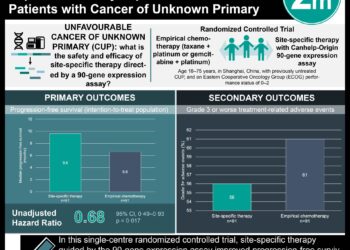BRCA1/2 pathogenic variants are associated with an increased risk of male breast, pancreatic, and stomach cancer.
1. Pathogenic variants of BRCA1 or BRCA2 are associated with an increased risk of pancreatic and stomach cancer in both sexes
2. Only BRCA2 carriers have an increased risk of prostate cancer
Evidence Rating Level: 2 (Good)
Study Rundown: Pathogenic variants (PVs) of BRCA1 and BRCA2 are known to be associated with an increased risk for female breast and ovarian cancer, however, their association with other cancers is unclear. This study aimed to determine age-specific risk estimates for cancers associated with BRCA1/2 PVs. BRCA1 PVs were found to be associated with male breast (relative risk (RR) = 4.30), pancreatic (RR = 2.36), and stomach cancer (RR = 2.17). BRCA2 PVs were associated with those same cancers (RR = 44.0, 3.34, and 3.69, respectively) as well as with prostate cancer (RR = 2.22). Age-specific absolute risks (AR) for cancer were 0.4% (BRCA1) and 3.8% (BRCA2) at 80 years old for male breast cancer; 2.3% and 3.0% pancreatic cancer risk for BRCA1 and BRCA2 carriers; stomach cancer AR was 1.6% for male and 0.7% for female BRCA1 carriers, while it was 3.5% for BRCA2 carriers overall. BRCA2 was associated with increased AR for prostate cancer at 26.9% by 80 years old, and 33.1% by 85 years. Limitations to this study include its retrospective and self-reported family cancer history, which may be inaccurate; results were presented without multiple testing adjustments; as well as missing data on environmental and other genetic factors. Overall, BRCA1/2 PVs are associated with increased risk of pancreatic, stomach, and male breast cancer; only BRCA2 is associated with heightened prostate cancer risk.
Click to read the study in The American Society of Clinical Oncology
Relevant Reading: Therapeutic Implications of Germline Testing in Patients With Advanced Cancers
In-Depth [retrospective cohort]: This retrospective, family-based study included 3,184 BRCA1 and 2,157 BRCA2 families. BRCA1 PVs were found to be associated with the following cancers: male breast (RR = 4.30; 95% confidence interval (CI), 1.09 to 16.96), pancreatic (RR = 2.36; 95% CI, 1.51 to 3.68), and stomach cancer (RR = 2.17; 95% CI, 1.25 to 3.77). BRCA2 PVs were also associated: male breast (RR = 44.0; 95% CI, 21.3 to 90.9), pancreatic (RR = 3.34; 95% CI, 2.21 to 5.06), and stomach (RR = 3.69; 95% CI, 2.40 to 5.67) in addition to prostate cancer (RR = 2.22; 95% CI, 1.63 to 3.03). Age-specific AR for male breast cancer was 0.4% (95% CI, 0.1% to 1.5%) for BRCA1 and 3.8% (95% CI, 1.9% to 7.7%) for BRCA2 at 80 years old. Pancreatic cancer risk was 2.3% and 3.0% for BRCA1 and BRCA2 carriers. The AR for stomach cancer was 1.6% (95% CI, 0.7% to 4.0%) for male and 0.7% (95% CI, 0.3% to 1.7%) for female BRCA1 carriers, while it was ~3.5% for BRCA2 carriers overall. BRCA2 was associated with increased AR for prostate cancer at 26.9% (95% CI, 20.5% to 34.7%) by 80 years old, and 33.1% (95% CI, 25.5% to 42.2%) by 85 years. Notably, this study did not show any other clear associations with other primary cancers which helps refine cancer risk estimates for patients with these PVs.
Image: PD
©2022 2 Minute Medicine, Inc. All rights reserved. No works may be reproduced without expressed written consent from 2 Minute Medicine, Inc. Inquire about licensing here. No article should be construed as medical advice and is not intended as such by the authors or by 2 Minute Medicine, Inc.


![Maternal cell-free DNA sequencing superior to standard aneuploidy screening [CARE Study]](https://www.2minutemedicine.com/wp-content/uploads/2014/02/47-karyotype-350x250.jpg)






